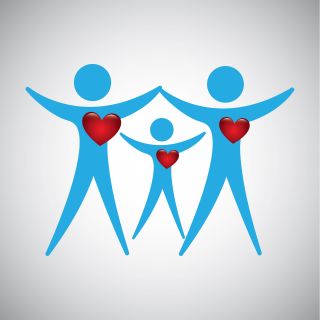Genetics
Accurate Terminology in Egg Donation Families
The person who contributes the egg is the biological or genetic mother.
Posted April 30, 2024 Reviewed by Michelle Quirk
Key points
- There is no need to ignore, minimize, or negate a child's genetic connection to their donor relatives.
- Accurate terminology, along with honest and open communication, are key—right from the start.
- Confident parenting includes acknowledging and honoring their child's donor family kinship.

People often reveal themselves by the language they use and, sometimes, by the language they deliberately avoid. Defining language around family is important in egg (and embryo) donation families—specifically, the confusion surrounding the terms "biological mother" and "genetic mother."
Using clear and accurate terminology is important for donor-conceived children and adults alike. There is no child too young to hear about their origin story,1 and, in fact, research suggests that donor-conceived individuals thrive best when informed from the start, fostering a sense of perpetual awareness about their unique origin story. Children can be introduced very early on to the concept that each person has two genetic or biological parents,* one providing the egg and the other the sperm, each endowing approximately 50 percent of the DNA required to form a new life.
Terminological Discrepancies
A unique disparity in terminology emerges within egg donor families, unlike sperm donor families, as the nonbiological mother often carries and gives birth to the child. While phrases like "I carried and delivered my child, so I am the biological/genetic mother" are commonly heard from egg-donor mothers of young children, it's imperative to distinguish between maternal roles and genetic contributions. Though undoubtedly a mother in every sense, she is not the biological mother.
As her child matures and learns about and delves into discussions about inherited traits and predispositions, it becomes essential to frame these conversations accurately. How should she navigate topics like inherited diseases and physical characteristics? Can she confidently assert her biological/genetic connection despite the egg donor's contribution? How might she describe a mother who contributed the egg but had a surrogate carry and deliver the baby? Those moms describe themselves as the biological/genetic mother, even though someone else might have had some epigenetic influence from nurturing the baby in utero for nine months. These complex dynamics underscore the need for precise terminology that respects biological lineage while acknowledging the role of epigenetic influences during gestation.
Epigenetics
Epigenetics involves genetic control by factors other than an individual's DNA sequence. Epigenetic changes can switch genes on or off and determine which proteins are transcribed, and while epigenetic changes do not alter the sequence of DNA, they can cause mutations.2 Only biological/genetic parents can pass along ancestry, physical and mental traits, blood type, and medical and genetic diseases. They are also who the child will match with as “parent” on any DNA test.
Parent and Parenting
The term "parent" encompasses biological roles—those who contribute genetic material—and active roles in raising, nurturing, and loving a child. Egg donor moms who avoid accurate terminology may experience an underlying or unacknowledged discomfort with the lack of biological connection between them and their children. It's crucial to recognize that lacking a biological tie does not diminish one's role as a parent. For nonbiological parents of donor-conceived children, it's paramount to address any feelings of discomfort, grief, or insecurity regarding the lack of genetic connection. Ideally, these concerns should be addressed before pregnancy, and certainly before discussing conception with the child, which is ideally during their pre-verbal years. The earlier the better. Confidence in one's parental role lays the foundation for acknowledging and embracing the child's donor family connections with honesty and authenticity.

Egg Donor Perspective
Egg donors can face backlash if, when expressing the desire for contact with recipient families (often the only way to share and update medical information), they use accurate terminology like "genetic parent," "biological mother," or even "genetic half-sibling." While such openness and willingness to make contact should be commended, it can sometimes be misconstrued as a threat by recipients.
However, acknowledging the egg donor's biological or genetic contribution does not diminish the recipient parents' role; rather, it can enrich the child's understanding of their heritage and medical background, fostering a sense of completeness in their identity. If meeting each other is proposed and desired, that, too, can greatly benefit the child. Why not be able to grow up knowing one's close relatives, including biological parents and half-siblings (either the donor's children or other families that also used the donor's gametes)?
Nature and Nurture: A Unique Blend
At the heart of this discourse lies the well-being of the children. Honest and precise terminology can empower children to navigate their identity confidently, without fear of upsetting their parents. As donor children grow and evolve, their understanding of their origin story may shift and deepen, and they should be encouraged to explore terminology and express their feelings openly. We want children to know that they’re a special and unique combination of both nature and nurture and that all of the parents have a huge impact on the child: the parents that a child grows up with, along with the biological parents that a child may never meet.
The Role of Professionals
Counselors, therapists, and medical professionals can play a vital role in promoting and encouraging parents to use accurate terminology in egg and embryo donation families. Using honest terminology and dialog fosters trust, strengthens communication, and empowers donor-conceived people to understand their unique identities. It's what donor-conceived people want. Professionals can motivate and inspire by celebrating the love and complexity of these families, ensuring that children feel comfortable and confident knowing, exploring, and sharing their origin stories.
Definitions
- Biological parent: a parent, mother or father, who has contributed half the chromosomes and genes to an individual.3
- Genetic mother: a woman whose contribution to the child was the ovum, and hence genes.4
*Except in the case of mitochondrial donation; then a child will have three people who contributed genetics.
References
1. Wendy Kramer. Your Family: A Donor Kid's Story. Donor Sibling Registry. 2018.
2. Simmons, D. (2008) Epigenetic Influences and Disease. Nature Education 1(1):6. The behavior of a person's genes doesn't just depend on the genes' DNA sequence—it's also affected by epigenetic factors. Changes in these factors can play a critical role in disease.
3. Oxford Reference. https://www.oxfordreference.com/display/10.1093/oi/authority.20110803095507129
4. Free Dictionary. https://medical-dictionary.thefreedictionary.com/genetic+mother
Wendy Kramer. Words have power in sperm and egg donor families. Psychology Today. April 19, 2022.




